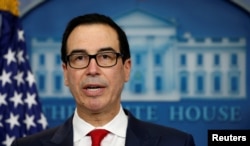A proposed border tax in the House of Representatives was killed on Thursday, bringing relief to retailers and other large importers whose profits faced threats and removing a hurdle that had kept negotiations on the long-promised Republican overhaul of the U.S. tax code from advancing.
The border adjustment tax was part of a broad reform of the tax code being pushed by House Republican leaders. It was meant to discourage companies from manufacturing products overseas and then importing them into the United States for sale instead of producing goods in the U.S.
The tax would have generated roughly $1 trillion in revenue, allowing tax-code writers to slash the corporate tax rate without increasing the nation's deficit.
Removing the controversial provision could make it easier to pass tax legislation, but likely narrows the scope of what could become law. It suggests Republicans are more likely to implement simple rate cuts and not accomplish sweeping tax reform on the scale of the last major overhaul in 1986, such as moving to a territorial tax system, in which companies would pay tax only on profits earned in the United States.
Without a new source of revenue, it will make it more difficult for Republicans to make tax code changes permanent and deficit-neutral. The Republicans are looking to use rules that would require passage of a tax bill only with a simple majority - meaning they would not need any Democratic votes. Those rules restrict creating long-term deficits, so if the bill is not deficit-neutral the tax cuts would likely carry an expiration date.
The group of six Republican negotiators working on tax reform on Thursday did not announce any agreement on their target for corporate rate cuts - a signal that tax lobbyists said shows continuing divisions among Republicans about the closely watched rate.
Corporate profits are currently taxed at 35 percent, but President Donald Trump wants them slashed to 15 percent, which he says will promote business spending, economic growth and job creation.
"While we have debated the pro-growth benefits of border adjustability, we appreciate that there are many unknowns associated with it and have decided to set this policy aside in order to advance tax reform," the "Big Six" Republican tax negotiators said in a joint statement.
Large retailers and other importers had lobbied aggressively against the border tax proposal, including a coalition that included automakers like Toyota and stores like Target , Autozone and Best Buy.
The retailers argued that the border tax would drastically increase consumer prices, hitting low- and middle-class households the most.
The Big Six is comprised of Treasury Secretary Steve Mnuchin and Gary Cohn, the head of the National Economic Council - both representing Trump - House Speaker Paul Ryan, Senate Majority Leader Mitch McConnell and the heads of the two tax-writing committees in Congress, Senator Orrin Hatch and Representative Kevin Brady.
In addition to killing the border tax, the group offered other vague goals but no details, saying they remain committed to increased expensing for corporations, or allowing them to write off the cost of new equipment more quickly, and to return profits held by American companies overseas, known as repatriation, at a lower tax rate than the current 35 percent.
The statement offered no specific goals or targets on the personal income tax code.
"We have always been in agreement that tax relief for American families should be at the heart of our plan," the Big Six said.
Trump has vowed to finish a tax overhaul by the end of this year.
Republicans leaders in Congress are hopeful that the current debate on repealing and replacing Obamacare, which is now before the Senate, can be completed quickly, allowing Congress to then turn its attention to the tax code.
The U.S. Chamber of Commerce praised the announcement as progress toward an ultimate goal of overhauling the code.
"We're pleased, but we're not satisfied until we get an outcome," said Neil Bradley, the head of policy for the business group.






